Opinion: Focus on fighting ‘terrorists’ ignores real humanitarian needs in Cabo Delgado
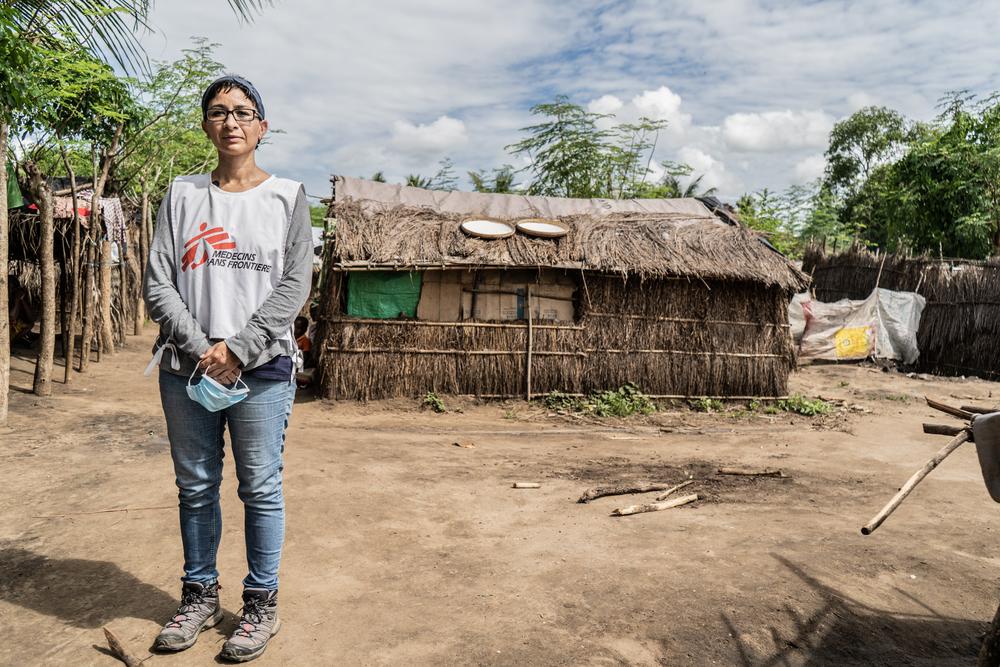
Maria Chavez is the project medical referent for Doctors Without Borders in Pemba, Mozambique. Here she is seen at the Nicuapa camp where Doctors Without Borders is running a mobile clinic to treat internally displaced people and is working to ensure that water sanitation and hygiene measures are put in place to stop the spread of disease. © Tadeu Andre/MSF
The recent attacks in Palma are illustrative of the violence that the population has been exposed to during the conflict in Cabo Delgado, which has been increasing in intensity and spreading over the last year. In Palma, as in many previous attacks, violence hit members of the community, including women and children, and thousands of people were forced to flee for their lives while others remained trapped in the settlements nearby the Afungi gas compound (Quitonda and Maganja). Those who have returned to Palma city continue to face insecurity.
The UN estimates that nearly 700 thousand people have already been displaced and are in dire need of humanitarian assistance. While the needs are growing exponentially, ongoing insecurity and bureaucratic constraints continue to hinder international organizations capacity to scale up much needed humanitarian aid.
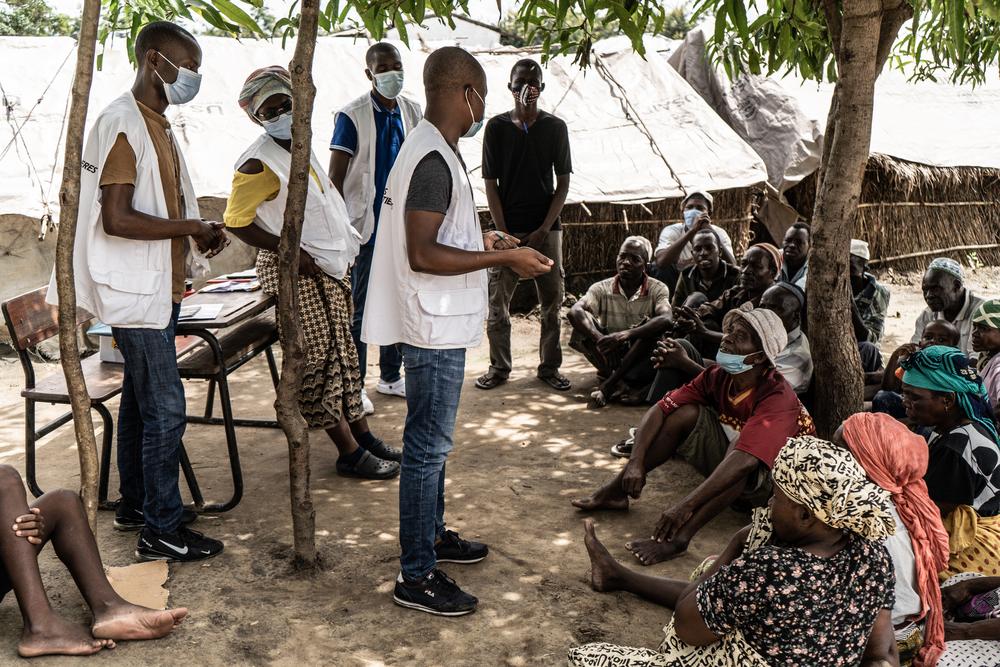
A mental health session is conducted with people who have sought shelter in the Nangua camp for internally displaced people. These sessions are used to help those displaced by the armed conflict in Cabo Delgado talk about their experiences and get support for issues like PTSD. © Tadeu Andre/MSF
Today Doctors Without Borders/Médecins Sans Frontières (MSF) has teams are working in Metuge, Montepuez, Nangade, Mueda and Macomia with temporary activities in Namuno, Balama, Ancuabe, Meluco and Pemba. We provide healthcare, including mental health, to the people displaced by the conflict and to the host communities by supporting health centres and cholera treatment centres and by running mobile clinics. Non-Food Items’ distributions (such as plastic sheets for shelter, mosquito nets, hygienic sets, cooking sets and tools for farming) have also been done for people living in temporary settlements who have escaped from their villages with nothing but their clothes. Water supply is organized to improve access to clean water and sanitation is also improved through the construction of latrines.
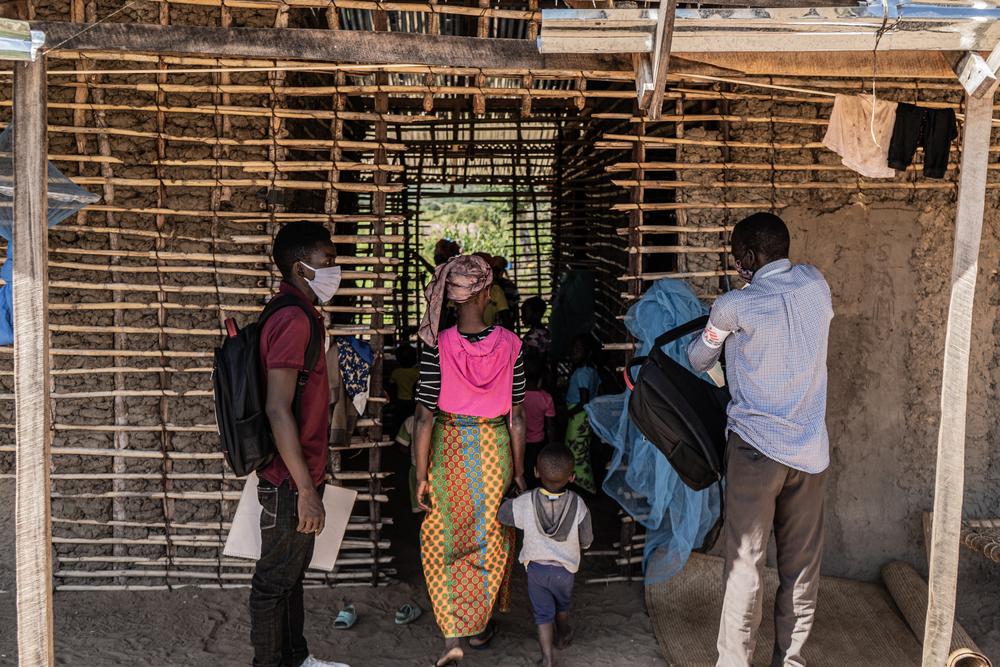
Samuel (L) a mental health promoter, and Ibrahimo (R) a health promoter working with Doctors Without Borders enter a house which is currently home to over 40 people who had fled the armed conflict in Cabo Delgado. The mainly women and children living there now struggle to see that everyone is able to eat due to there being a shortage of food and money in the home. © Tadeu Andre/MSF
Three important developments took place in Mozambique’s Cabo Delgado province in less than six weeks, all of which will have a significant future impact on human lives.
First, in mid-March the United States government designated an armed opposition group operating in Cabo Delgado as a ‘terrorist’ organisation and sent military advisors to train the Mozambique army on counter-terrorism measures. A fortnight later, the town of Palma – close to a multi-billion dollar gas project run by the French company Total – was attacked by an armed group in a high profile and brutal assault that killed a still unknown number of people and displaced at least 30,000. And in early April, the Southern African Development Community (SADC) countries “condemned the terrorist attacks in strongest terms; and affirmed that such heinous attacks cannot be allowed to continue without a proportionate regional response”. SADC deployed a “technical mission” to Mozambique that has recommended the deployment of 3,000 troops from the region.
Much of this recent attention on Cabo Delgado was fuelled by the claims of the opposition groups link to the Islamic State (IS) and the killing of foreigners in the attack on Palma. While the conflict has been going on since 2017, it has received very little political attention from regional governments or international actors – except those interested in Mozambique’s gas reserves or private military contracts. Much less attention has been given to the growing number of displaced people – now over 700,000 – and the critical humanitarian crisis facing the province.
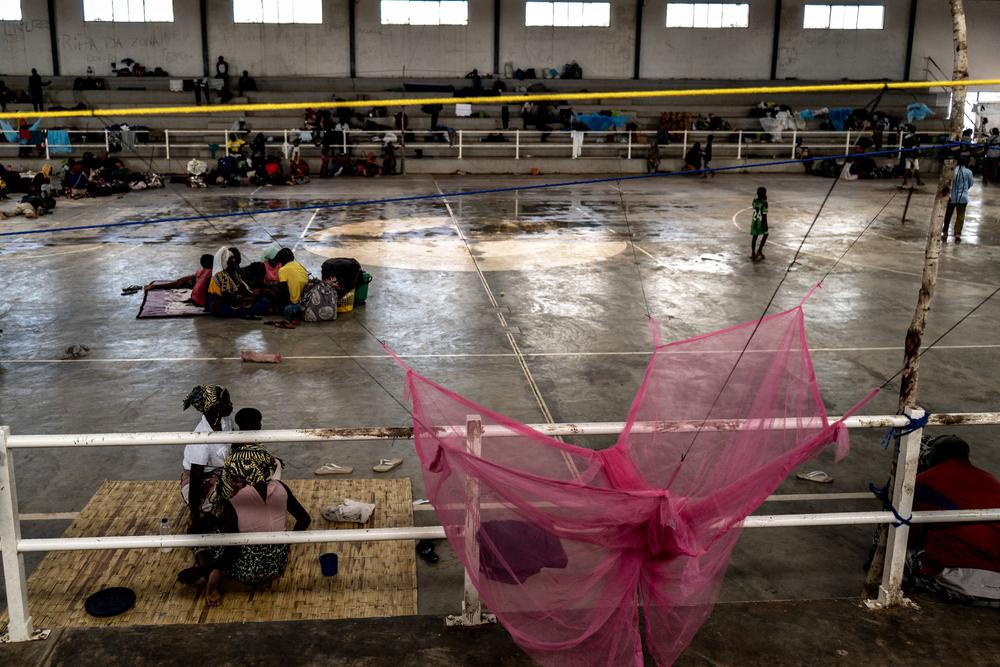
People sit inside a stadium which has been converted to a reception centre for internally displaced people fleeing the armed conflict which has been taking place in Mozambique's Cabo Delgado province. © Tadeu Andre/MSF
Cabo Delgado might not be a forgotten conflict, but it certainly is a neglected humanitarian crisis. And now, with the attention from the SADC region and the Mozambican government’s international backers fixed almost exclusively on ‘fighting terrorism’, the solutions being proposed may once again overlook the urgent need to save lives, and alleviate the suffering, of scores of conflict affected communities.
Hundreds of thousands of people have fled violence and insecurity and they have ended up living in over-crowded camps or being hosted by local communities with already limited resources. People have experienced significant trauma: a decapitated husband, a kidnapped wife, a son or daughter from whom they have no news. Many walk for days to find safety after hiding in the bush, often without food and water. Others remain in locations where humanitarian actors cannot reach because of the ongoing insecurity.
While the reasons for this conflict might be multifaceted and complex, the consequences of the violence are strikingly simple: fear, insecurity and a lack of access to the basic needs for survival, including food, water, shelter and urgent healthcare.
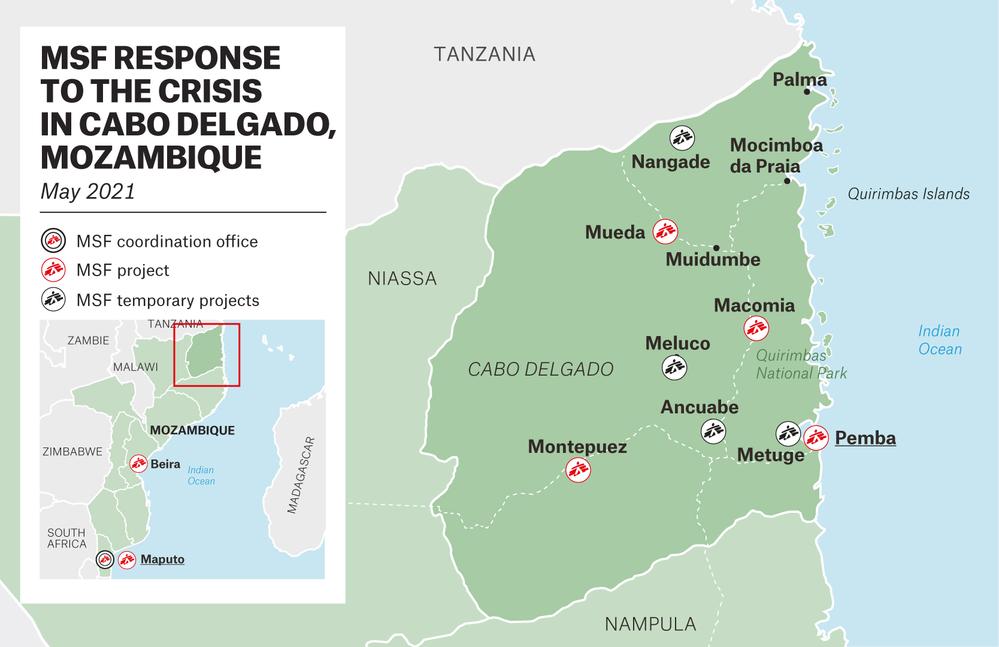
Map detailing the Doctors Without Borders response to the crisis in different localities of Cabo Delgado © MSF
Meanwhile, significant restrictions are placed on the scale up of the humanitarian response due to the ongoing insecurity and the bureaucratic hurdles impeding the importation of certain supplies and the issuing of visas for additional humanitarian workers. Having recently returned from Cabo Delgado, I have seen first-hand how the scale of the humanitarian response in no way matches the scale of the needs.
What does seem set to scale up is the regionally supported and internationally funded counter-terrorism operation that could further impact an already vulnerable population. In many conflicts, from Syria to Iraq and Afghanistan, I have seen how counter-terrorism operations can generate additional humanitarian needs while limiting the ability of humanitarian workers to respond.
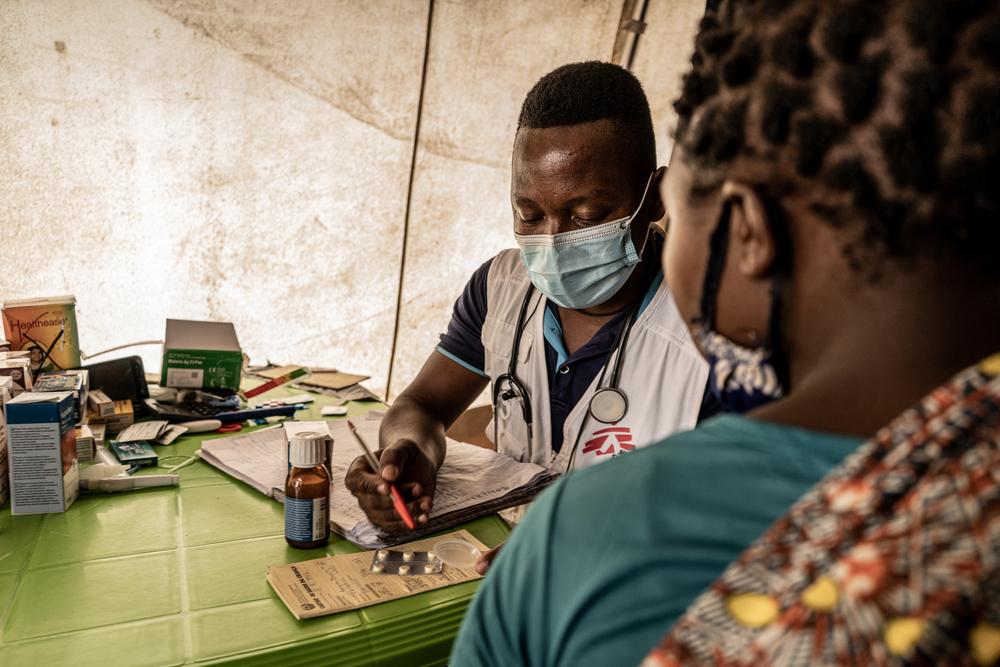
Physician Nazario Jaime is seen during a consultation with a patient living in the Nicuapa site in Cabo Delgado province. The camp is now home to internally displaced people who have been forced to flee fighting in Mozambique’s northern most province. © Tadeu Andre/MSF
Firstly, by designating a group as ‘terrorists’, we often see that the groups in question are pushed further underground – making dialogue with them for humanitarian access more complex. While states can claim that they “don’t negotiate with terrorists”, humanitarian workers are compelled to provide humanitarian aid impartially and to negotiate with any group that controls territory or that can harm our patients and staff. Many aid organisations shy away from this in places where a group has been designated as “terrorists” out of fear of falling foul of counter-terrorism legislation. For Doctors Without Borders, successfully providing impartial medical care requires reserving a space for dialogue and building trust in the fact that our presence in a conflict is for the sole purpose of saving lives and alleviating suffering.
Yet, counter-terrorism operations try to bring humanitarian activities under the full control of the state and the military coalitions that support them. Aid is denied, facilitated or provided in order to boost the government’s credibility, to win hearts and minds for the military intervening, or to punish communities that are accused of sympathising with an opposition group. The most vulnerable can often fall through the cracks of such an approach, which is why organisations like Doctors Without Borders need to be able to work independently. The reason why humanitarian workers cannot be aligned with a state and its military backers is that often states and those affiliated with them are clear targets of armed opposition groups. Being aligned to a state that is fighting a counter-terrorism war would reduce our ability to reach the most vulnerable communities to offer medical care.
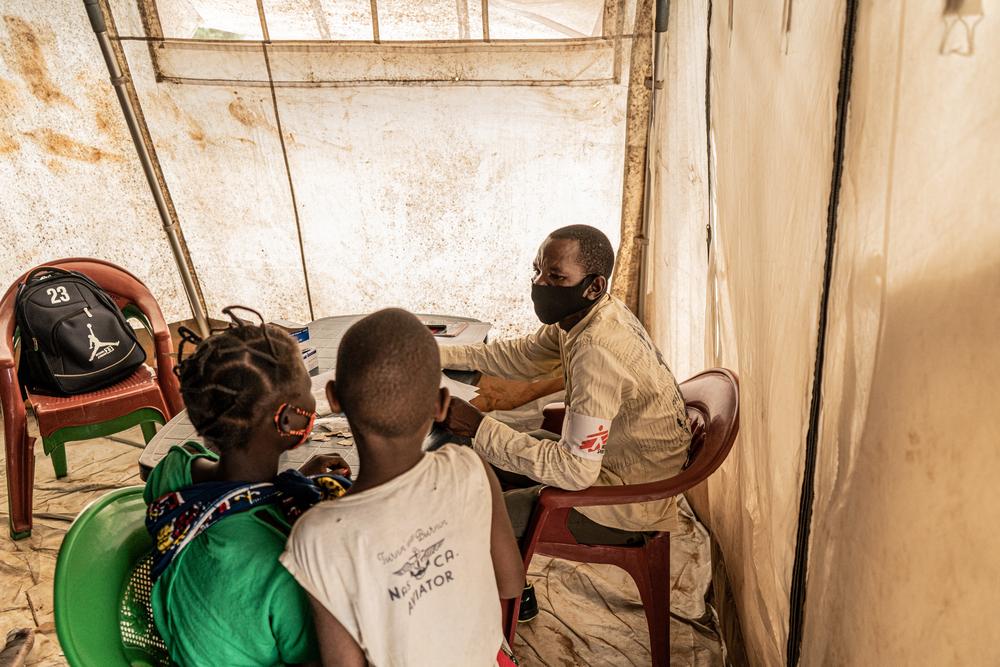
Patients are seen inside a mobile clinic set up and operated by Doctors Without Borders in Nicuapa, a camp for internally displaced people who have fled fighting in parts of Mozambique's Cabo Delgado province. As a result of the conflict large numbers of people requiring medical attention have been unable to reach it in these camps and surrounding cities like Pemba and Montepuez. © Tadeu Andre/MSF
At Doctors Without Borders we know this can come at a time when we are needed the most. In counter-terrorism wars around the world we often see civilian casualties being justified due to the presence of ‘terrorists’ among a civilian population. Entire communities can be considered as ‘hostile’, leading to a loosening of the rules of engagement for combat forces. It is in these situations that we have often seen hospitals destroyed and entire villages razed to the ground in attacks that fail to distinguish between military and civilian targets. Communities are often trapped between indiscriminate violence by armed groups and the counter terrorism response from the state.
The current focus on ‘terrorism’ clearly serves the political and economic interests of those intervening in Mozambique. However, it must not come at the expense of saving lives and alleviating the immense suffering facing the people of Cabo Delgado.
Jonathan Whittall is based in Johannesburg and is the Director of the Analysis Department at Doctors Without Borders/Médecins Sans Frontières(MSF). He can be found on Twitter @offyourrecord.